Jun 25, 2018 | Eco-Friendly Events
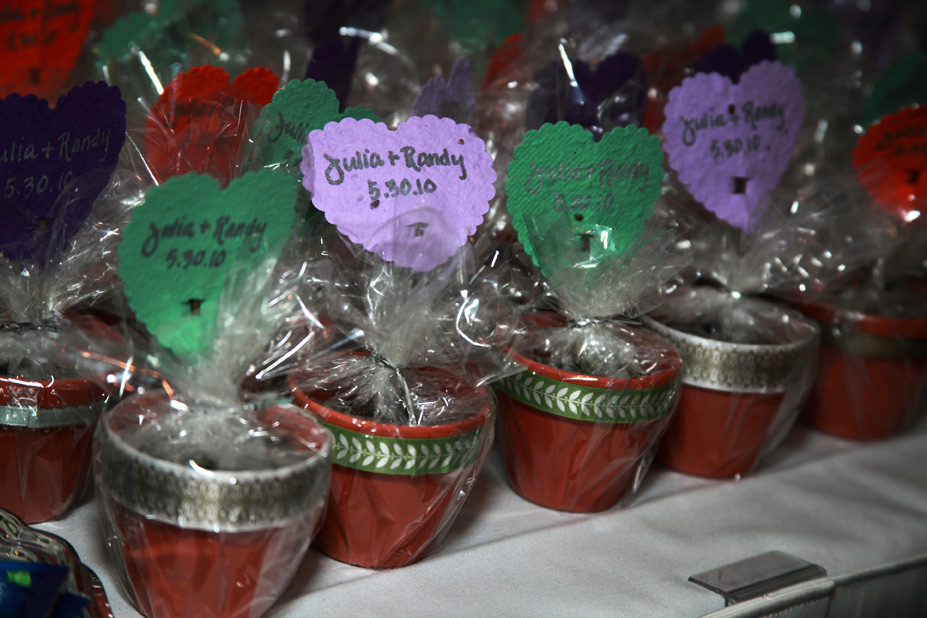
It’s the little things that count: This couple was able to give sustainable favors to their guests. Photo courtesy of christytylerphotography.com
I run into a misconception sometimes: Green weddings are an East (or West) Coast fad for fashionable rich people who can afford to be sustainable. Nothing could be further from the truth! Far from being a fad or a lifestyle choice for the well-to-do, eco-friendly weddings and celebrations are an easy choice for everyone.
I think when people think of being environmentally conscious, they automatically assume the need for organic food and flowers–and we know that organic is going to be more expensive than conventional. On the other hand, I would say that while organics are one possibility at your celebration, it is probably more important to make sure that there is a minimum of food waste, and that might actually save you money.
The thing about sustainability is that it often means doing less, rather than spending more. Maybe you will decide to skip buying favors for your guests, for example. That means less shipping and less overall waste, and it is less expensive. Perhaps you will opt for a venue that needs no decoration so you don’t have to put money into decor that just gets thrown out. Or, if you have decor left over, you can get it into the hands of someone who will re-use it. That might make you money, or, at least, will cost you nothing but time. And it is very eco-friendly!
The important thing to remember is that perfectly green solutions don’t exist. No one is insisting that if you have an environmentally friendly wedding that it has to be perfectly so. Frankly, I don’t think that any kind of standard of perfection ought to be applied to weddings, including how sustainable they are. If you want an eco-friendly wedding, do what you can with the time and money you have available. Every little bit helps.
And if you are expecting to hire a planner or day-of coordinator, you might as well hire one who can help you green your wedding. That doesn’t cost any more than any other kind of planner!
Jun 18, 2018 | wedding planning
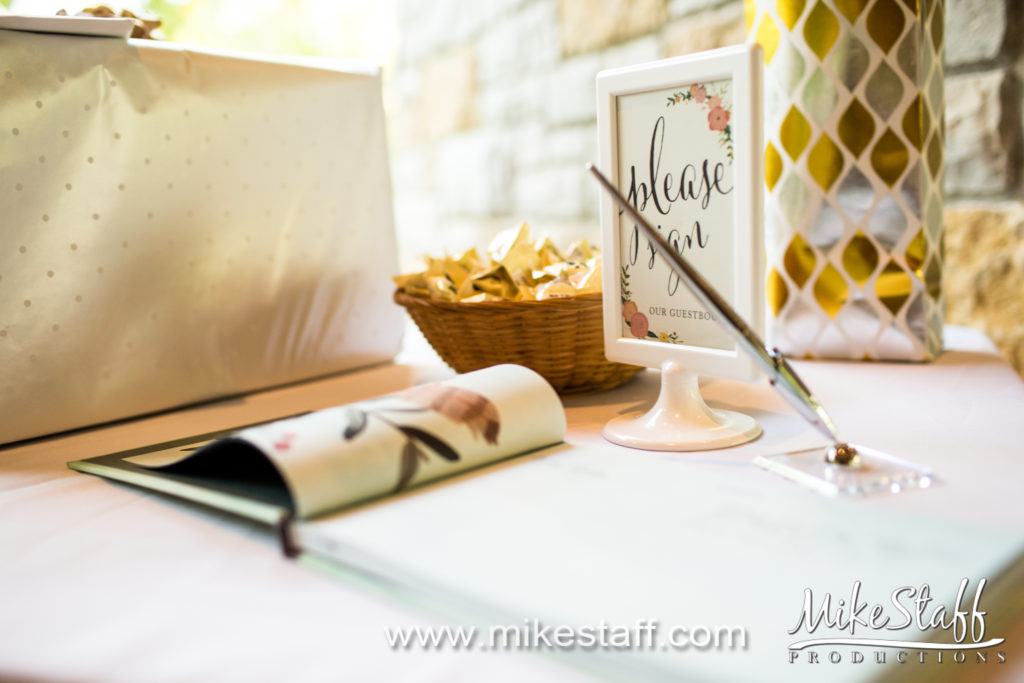
The most traditional of traditional guest books.
Are you planning to have a guest book at your upcoming wedding? There is no right answer to this question! It is one to consider, though, if you are coming up on the wedding soon.
I’ve seen some things online saying that the guest book used to be a legal document for all the witnesses to the wedding. But I have not seen any references for that statement, so I don’t know whether or not it is true. I would imagine that one traditional use of the wedding guest book would be if your entire church congregation is invited to the wedding, then a guest book would tell you who actually showed up. (It used to be more commonly the case that the reception following a church wedding would have a separate invitation, and not everyone was invited to both.)
The way most people do weddings these days, that would not be necessary, as the couple generally has a very good idea of who is coming and who actually shows up. So, then, what is the point of the guest book?
The way it has evolved, the guest book is now often a wonderful way for guests to write a note to the couple. The traditional, lined guest book (like the one at the head of this article) is not conducive to creativity, but a blank book (or other place for people to express themselves) often brings out heart-felt sentiments from the guests. There are plenty of other options, as well.
A creative couple I worked with a few years ago had this for their guest book:
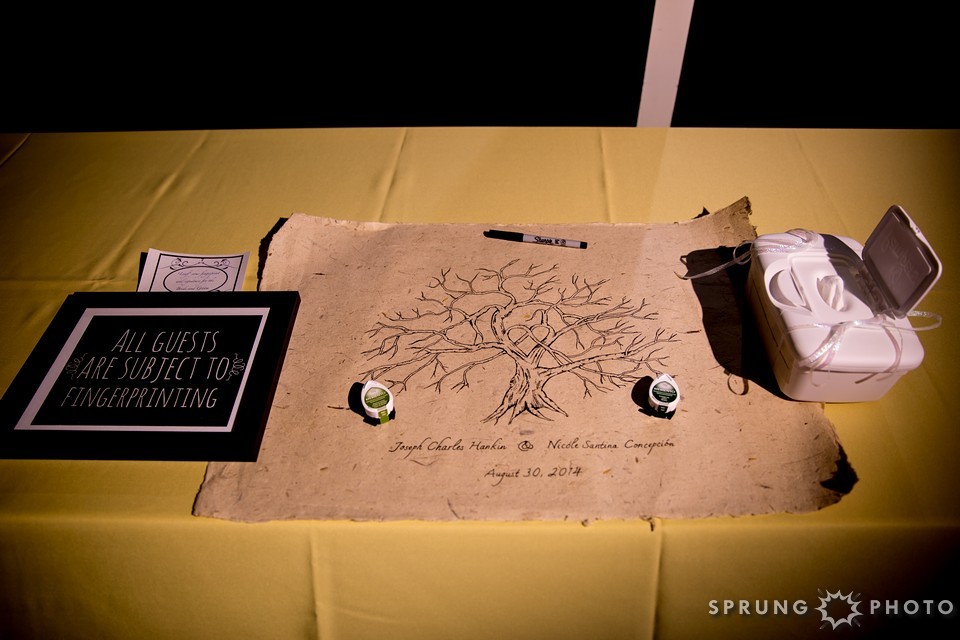 In case you can’t see what it is, it’s a drawing of a tree, with ink pads on it. The sign reads, “All guests are subject to fingerprinting.” The guests’ finger- and thumb-prints were added as the leaves on the drawing of the tree. There is also a pen there for guests to write their well-wishes.
In case you can’t see what it is, it’s a drawing of a tree, with ink pads on it. The sign reads, “All guests are subject to fingerprinting.” The guests’ finger- and thumb-prints were added as the leaves on the drawing of the tree. There is also a pen there for guests to write their well-wishes.
One of my very favorite recent guest books was at the wedding of a couple of scientists. Here was their guest book:
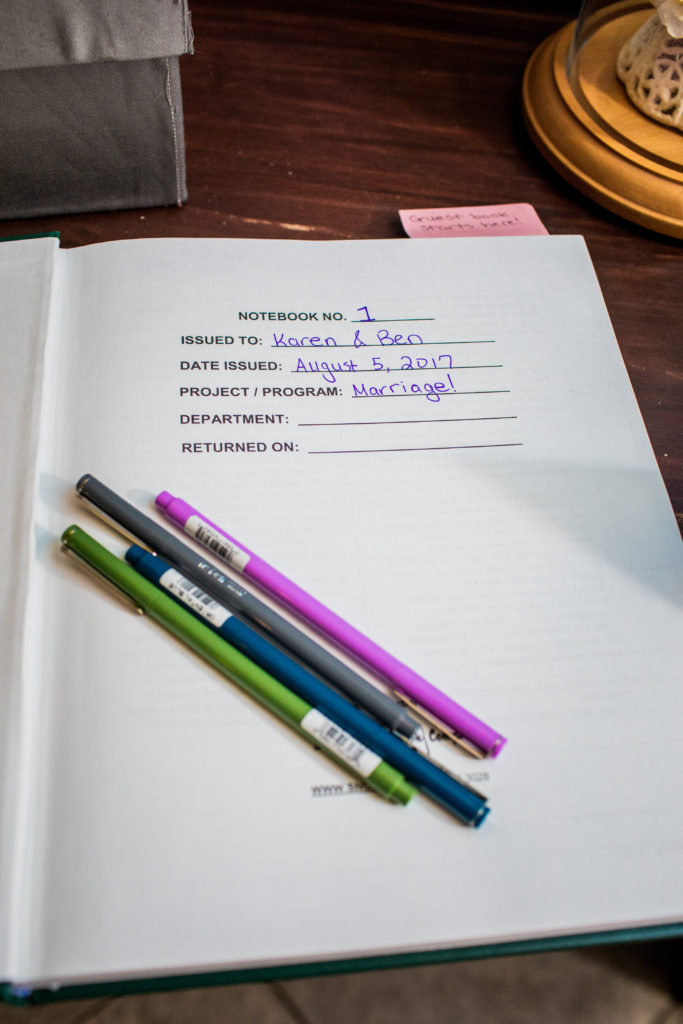
Photo by Allison Williams Photography.
Yes, that’s right: They used a lab book for their wedding guest book! And here is an example of how their guests used it:

Photo by Allison Williams Photography.
Of course, if you’re a traditionalist, there is nothing wrong with having a good, old-fashioned guest book.
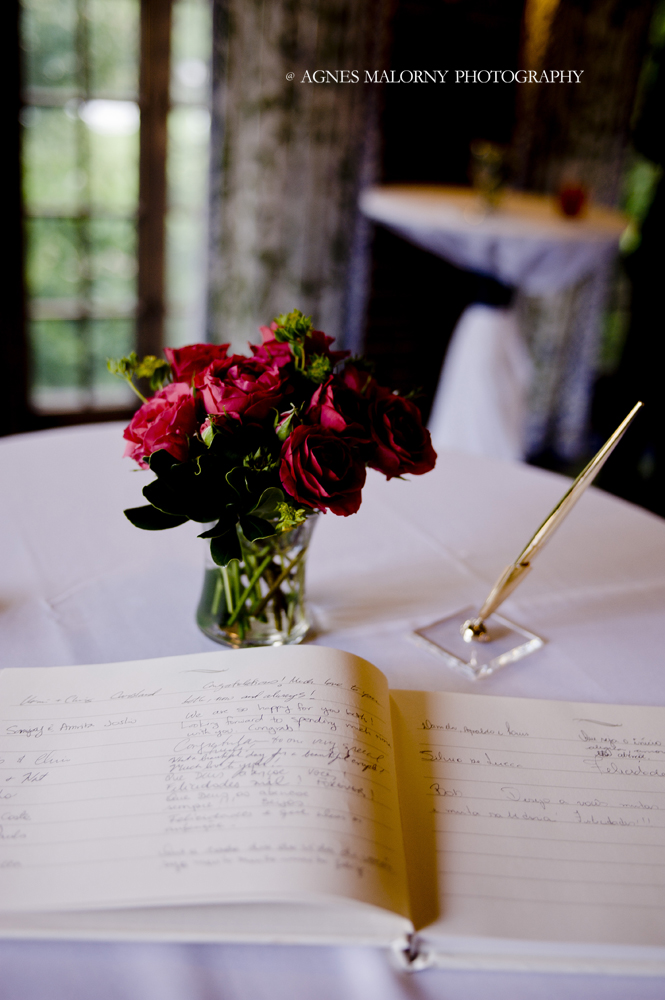
Jun 11, 2018 | Eco-Friendly Events
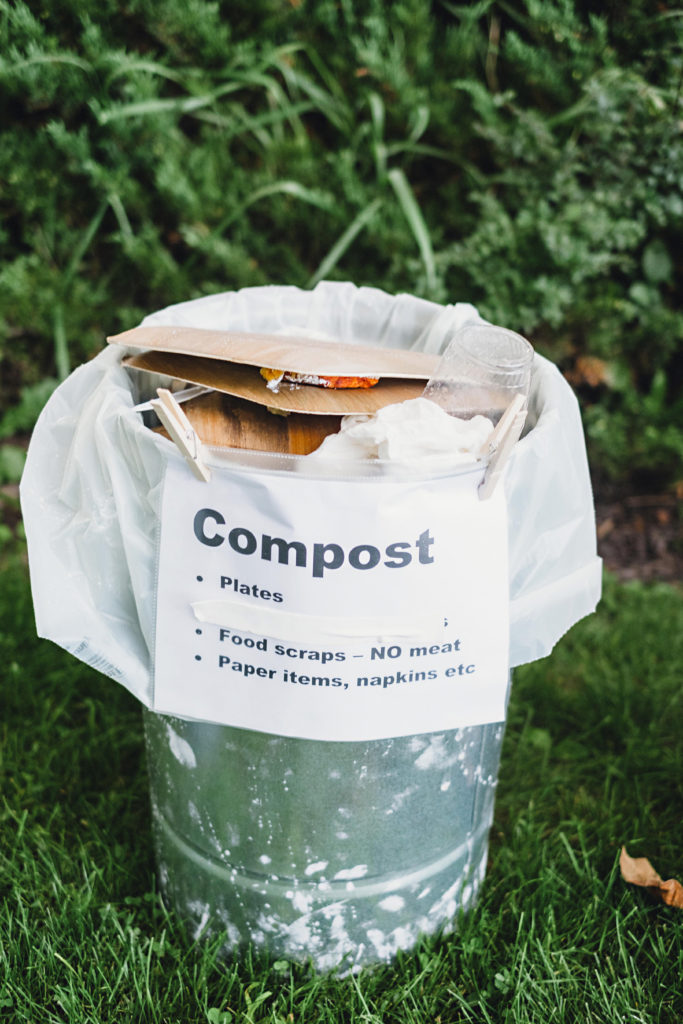
It is all about the compost bucket! Photo by Ryan Timm Photography.
A number of years ago, I wrote a post about compostable disposable dishes. At the time, it was the most accurate, up-to-date information I could find on the subject. But the world has evolved since then, and there is more to know now. So, here are some updates with what is new on the topic:
First, just what is a compostable disposable? Well, plastic (like, for plates, cups, flatware, etc.) can be made from petroleum. That kind is definitely not compostable and you have to throw it out. It is anything but eco-friendly.
But plastic can also be made from corn or sugar cane or various other plant-based sources. Dishes and so on made from that kind of plastic are marketed as being compostable. Compostable dishes can also be made from paper or from wood, such as bamboo. In theory, all of these dishes will break down into rich soil, given the right combination of heat, moisture, other nutrients, and microbial activity. Those dishes are more sustainable, as they don’t use petroleum as a base and they don’t have to end up in a landfill. In a perfect world, they end up on someone’s garden bed making the roses bloom.
So far, so good. But is it really that easy? Well, the first thing to know is that most of the compostable products that are available will not break down in your home compost pile. I have had good experiences with the kind of paper cups and bags that have a thin PLA (plant-based plastic) paper lining. It can still take a year or more for the plastic to degrade, but it does happen eventually. That is not the case with any of the heavier plastics, which require a very hot commercial composting facility.
The other thing to consider is the sourcing of the raw materials. It’s great that such a common (and local to the Midwest) crop such as corn can be used to make party dishes. I always wonder, though, if that is the best use of farmland. The jury is still out on this, but if using corn for plastic ends up driving up food prices, then perhaps it is an unsustainable practice in other ways than environmental. (In 2006, Smithsonian Magazine had a very good article that covered that issue, as well as many others implicated in the subject. For more updated information, try a web search on “biodegradable plastic problem” and you’ll turn up many more articles on the subject.)
What does all this mean for your eco-friendly celebration? One thing hasn’t changed: Probably the least wasteful, lowest impact kind of dishes are reusable ceramic dishes. If you don’t own them, you can rent them. (Or ask your planner for a list of facilities that include dishes in their rental cost!)
If you find that disposables are the best options, shop carefully. I find that restaurant supply stores have the best selection and prices. I like the Eco Products Store and Greenstaurant for most items. Read the descriptions thoroughly, though, and make sure the items are labeled as being compostable, as not everything on each site is. Also, don’t overlook the fact that standard-issue uncoated paper plates and paper napkins are all compostable.
Once used, you’ll want to make sure that all these compostable dishes (as well as food scraps) actually get composted and not thrown out. The easiest way to do that is to hire a composting service. My personal favorite is Collective Resource. They have drop-off service, as most composting companies do, but they will also send a staff member to your event to monitor the compost container and make sure everything is sorted properly. I recommend this highly if you want to be sure that only compostables get into the compost bucket, and that garbage or recycling goes elsewhere.
If you want to search out other composting services, a good (although incomplete) resource is Find A Composter, a national database of composting services.
Composting for your event has gotten a lot easier and more reliable in the last decade. We are definitely making progress in this area. I hope in another decade, we will see more big changes that improve the ways we can throw sustainable parties.
Jun 4, 2018 | wedding planning
I think my services must appeal to introverts as I seem to have a lot of clients who identify themselves that way. It makes sense: I am one, too. And I got married once, so I had an introvert wedding, and I understand some of the hurdles on the way to your introvert wedding.
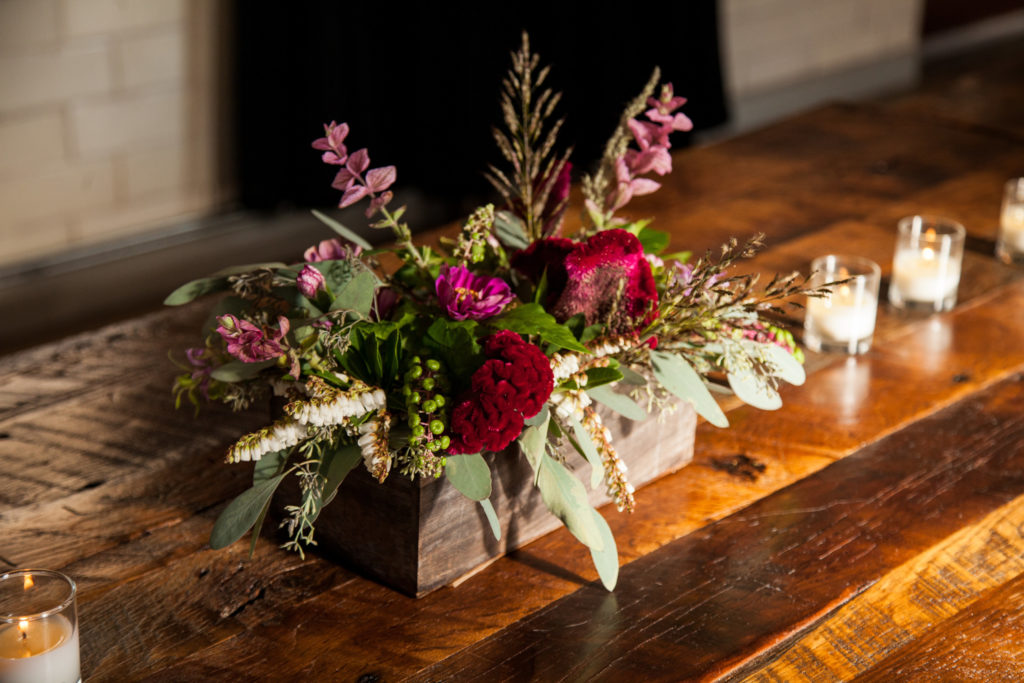
Introvert weddings can look just like extravert ones! (Photo courtesy of Cage+Aquarium. Flowers by May Floral.)
For those of you who are not introverts, perhaps a few definitions are in order. An introvert is not (necessarily) a shy person or an anti-social person. According to the Urban Dictionary, an introvert is “One who focuses on the inner world of thoughts and ideas.” A second definition is, “One who gains energy from alone time, one who thinks before they speak.” (Same source. Not my run-on sentence.)
In case it’s not obvious from the definition, there can be some definite difficulties for introverts getting married. A lot of us don’t care for being the center of attention. Crowds of people, even people we love, can be exhausting. Even things like being photographed are not always pleasant.
So, how do you navigate the difficulties inherent in such a public display as a wedding if you’re an introvert? I would say that the number one thing is to hire people to work on your wedding who understand your point of view and what you want–and who are willing to do what it takes to make your wedding live up to your vision for it. That doesn’t mean hiring all introverts, but it might mean taking the time to thoroughly interview all your wedding vendors to make sure they are sympathetic to your way of thinking, and trusting your gut when it comes to deciding on them. I’m also obligated at this point to mention that hiring a planner who understands your needs will get you access to other vendors with a similar point of view.
Two other things to think about are the size and the style of your wedding. If you can have a smaller wedding without offending friends and family (or if you don’t care!), it will likely be less stressful. And often a more casual wedding will be easier than a more formal one.
In the end, as with all weddings, it is up to you to decide how you want to get married and celebrate. If that means eloping and telling the family later, then that’s what you can do. If a more structured event is still something you want, just remember that you can still make the choices to make it work for you. There is no one right way to get married. There is only the way that is right for you.

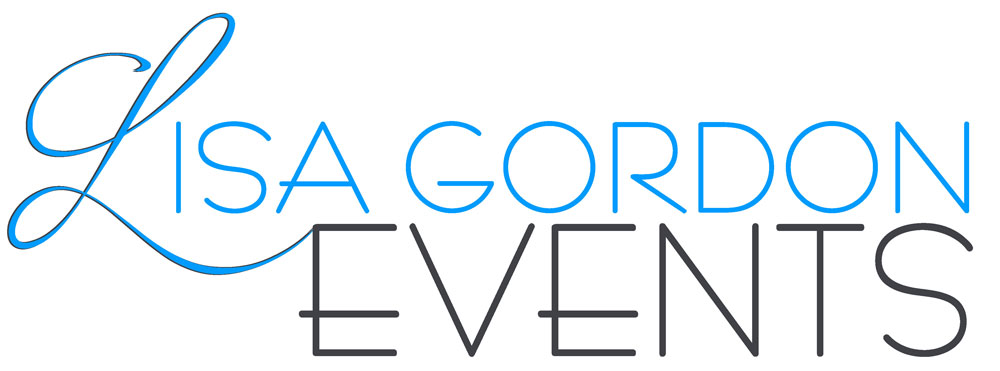







Recent Comments